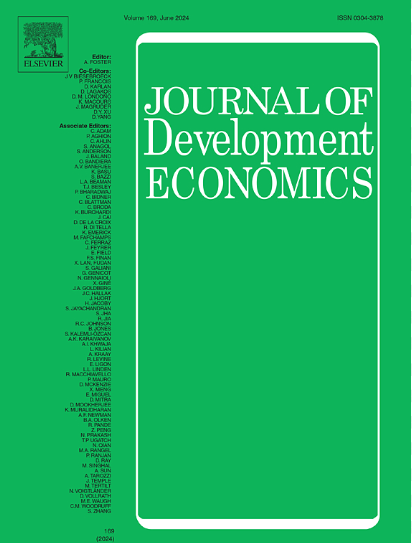风暴中的骑手:企业如何在厄尔尼诺现象中驾驭生产和市场环境?
IF 5.1
1区 经济学
Q1 ECONOMICS
引用次数: 0
摘要
本文研究了 2002-03 年厄尔尼诺气候模式导致的暴雨如何影响厄瓜多尔企业的生产和市场状况。我们发现,受影响企业的收入生产率(TFP-R)和加价率都有所下降。这是由于生产效率损失(TFP-Q)和最初效率较低企业的边际成本上升。由于产品需求减少,产品产出价格下降,这解释了对最初效率较高企业的影响。然而,冲击既没有影响市场份额,也没有影响最初效率较低企业的存活率。因此,厄瓜多尔工业的生产力分布并未受到冲击的影响。我们还发现,冲击过后,生产和市场需求迅速恢复。2002-03 年的影响与 1997-98 年降雨冲击的影响类似。根据全要素生产率而不是生产效率对企业进行区分,可以看出市场地位较好(较差)的企业能够更多(更少)地减轻冲击的负面影响。本文章由计算机程序翻译,如有差异,请以英文原文为准。
Riders on the storm: How do firms navigate production and market conditions amid El Niño?
This paper investigates how heavy rainfalls resulting from the 2002–03 El Niño climate pattern affect Ecuadorian firms' production and market conditions. We show that affected firms' revenue productivity (TFP-R) and markups decrease. This is due to production efficiency losses (TFP-Q) and higher marginal costs of initially less efficient firms. Decreased product output prices in response to lower product demand explain the impact on initially more efficient firms. However, the shock neither affects market shares nor survival rates of initially less efficient firms. Consequently, the productivity distribution of Ecuador's industry is not affected by the shock. We also show a swift recovery of production and market demand in the immediate aftermath of the shock. Impacts in 2002–03 are like those of the 1997–98 rainfall shock. Differentiating firms by their TFP-R rather than their production efficiency indicates firms with better (worse) market positions can mitigate the negative impacts of the shock more (less).
求助全文
通过发布文献求助,成功后即可免费获取论文全文。
去求助
来源期刊

Journal of Development Economics
ECONOMICS-
CiteScore
8.30
自引率
4.00%
发文量
126
审稿时长
72 days
期刊介绍:
The Journal of Development Economics publishes papers relating to all aspects of economic development - from immediate policy concerns to structural problems of underdevelopment. The emphasis is on quantitative or analytical work, which is relevant as well as intellectually stimulating.
 求助内容:
求助内容: 应助结果提醒方式:
应助结果提醒方式:


